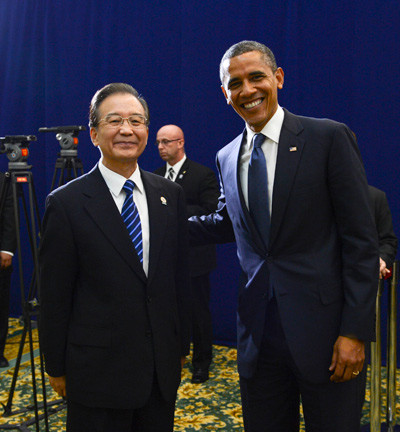|
 |
|
SUSTAINABLE TIES: Chinese Premier Wen Jiabao meets with U.S. President Barack Obama during the East Asia Summit in Phnom Penh, Cambodia, on November 20, shortly after Obama won a second term (MA ZHANCHENG) |
The U.S. presidential election of 2012 culminated with Barack Obama's triumph, ensuring that Obama's center-left line focused on supporting middle and low-income Americans will continue in the next four years. Obama's policy will have important implications for the global efforts to address wealth distribution problems.
Obama's second term will stick to the main tone of reviving the U.S. economy, reducing budget deficits by collecting more taxes from the rich, implementing healthcare reform, and reforming U.S. education and immigration policies. Washington's global strategic adjustment, known as a "rebalance," will be deepened. And its attitudes toward global hotspot issues are likely to be more aggressive. The United States may choose the path of realizing development through adjustment and maintaining advantages through reforms once again, which historically tended to happen when the country was faced with a crisis.
However, it is still doubtful whether Obama can guide the United States "forward" as he promised. The election highlighted many serious problems of the country: financial deficit and disorder, unemployment, sharp inter-party fighting, and faulty foreign policies. These are all deeply rooted systemic and structural problems that cannot be solved easily by a single U.S. president. In other words, Americans must admit and get used to the reality that the United States will have to face a long and fatiguing uphill climb.
Intertwining interests
Clamor surrounding China-related subjects was highly amplified during this year's U.S. presidential election. China, a country whose values, social system and strategic interests are different from those of the United States, became the casual target of both Democratic and Republican candidates. However, the focus on criticizing China now has shifted from human rights and democracy to economic and strategic issues. China is changing from a diplomatic topic to a domestic policy issue in the United States.
Does this mean the Sino-U.S. economic relationship will strike a reef? China should now have its answer. China and the United States have been each other's second biggest trade partner for many years. Their annual trade volume is more than $460 billion. According to U.S. official statistics, the country exported over $100 billion to China in 2011, while in 2008, the year Obama won his first presidential term, the number was less than $70 billion. It definitely won't take long before China becomes the top buyer of U.S. goods. Besides, China is still the biggest creditor of the United States. It is reasonable to believe that the Sino-U.S. economic ties have grown big enough and have merged tightly enough with the U.S. economy and employment that Americans will not allow them to be significantly damaged. The United States will pay as much as China following any tough action on trade.
China should pay more attention to the deep-seated and long-term problems reflected in debates about China during the latest U.S. presidential election.
The first problem is of the economy. The financial crisis sweeping Europe and the United States was accompanied by the so-called "third industrial revolution" characterized by the digitalization of industry and wide adoption of new energy. Both China and the United States value export and try to occupy a commanding height in processing and emerging industries. Their bilateral economic ties have surpassed the complementary and mutually needed pattern that has maintained during the past decades, and are turning to a more complex mode of interdependence amid competition.
With changes ahead, China must be prepared to face increasing economic conflicts with the United States. How to properly handle the cooperation and competition of their economic relationship is a pressing issue for both sides. They need to define the terms of the two countries' economic competition and work to shape better conditions for their future cooperation, so as to place their economic relationship on the right track of mutual benefit and win-win outcomes and meet their own demands for economic adjustment. Although frictions erupt from time to time, it should be acknowledged that changes in the Sino-U.S. economic relationship are consistent with China's efforts to transform its economic growth model. Therefore, both sides have reasons to be confident about and interested in potential cooperation opportunities.
| 